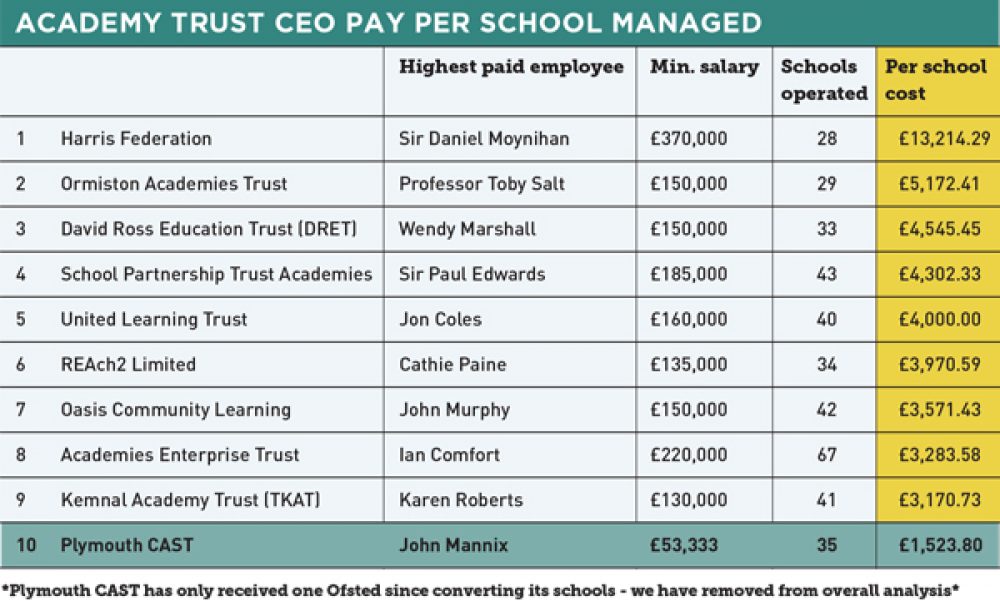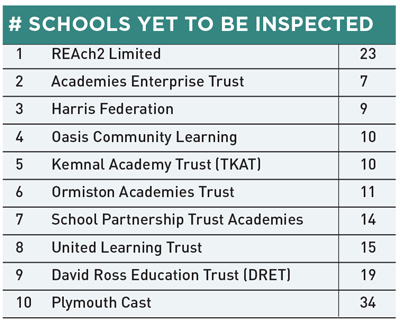The salary of the highest paid academy chain leader has soared to £370,000 – more than two-and-a-half times that of Prime Minister David Cameron.
Sir Daniel Moynihan, chief executive of the Harris Federation, saw his pay for running 28 schools increase by nearly £40,000 in 2014 – making him the highest paid boss of a multi-academy trust (MAT).
A joint investigation by Schools Week and Watchsted into the CEO pay and Ofsted performance of the 10 largest academy trusts, as defined by number of schools managed, has revealed that Sir Daniel’s salary level is £150,000 higher than that of the next-best paid academy boss, AET’s Ian Comfort.

Mr Comfort is chief executive of Academies Enterprise Trust (AET) – the largest chain in England. He received £220,000 in 2014 for running more than twice as many academies as the Harris Federation.
Academy CEO pay soars again in 2016 – read the latest story here
Unison’s head of education, Jon Richards, whose union represents more than 250,000 support staff in UK state schools, told Schools Week: “The explosion in senior pay across many academy trusts over the past few years is completely disproportionate.
“In the same period, school support staff have endured year upon year of pay freezes and real-term pay cuts.”
Every Ofsted inspection carried out at academies since they joined the Harris Federation has resulted in a good or outstanding rating. Moynihan’s pay divided by the current number of good or outstanding ratings would therefore put the CEO’s cost at £19,474 per school.
According to Harris’s financial statements for the year to August 2014, many of the academies which received “excellent” Ofsted inspection results had been “very challenging schools previously in special measures”.
AET operates 67 academies nationally. Thirty-two of its 60 Ofsted inspections have been good or outstanding, putting Comfort’s cost for every such school at £6,875. But in October last year the Education Funding Agency issued AET with a financial notice to improve and 28 of its schools have received requires improvement or inadequate ratings while under its watch.
An AET spokesman told Schools Week: “Our objective is for every one of our academies to become outstanding as soon as possible, and we are making real progress in this direction.”
School business director Micon Metcalfe, who also trains other education leaders, said that academy trusts are free to set salaries for CEOs and senior leaders at any level “they think appropriate”. But she noted that trusts must bear in mind that “remuneration needs to be proportionate and … not be seen by the general public as contentious or inappropriate.”
Ms Metcalfe added: “I do think academy boards should take into account the overall performance of the chain when setting the CEO salary and have appropriate key performance indicators in place.”
Russell Hobby, general secretary of the National Association of Headteachers, also defended the high salaries.
He said: “It can be right to pay school leaders significant sums of money, particularly if they are leading many schools in challenging circumstances.
“This can represent good value in terms of raising standards for children. The crucial thing is that these decisions are made fairly, transparently and with due process to reassure the public that these decisions are right.”
Plymouth CAST paid its chief executive the lowest salary among the trusts investigated, with John Mannix receiving £53,333. The group’s 35 schools converted from the diocesan network to being part of a multi-academy trust in April last year. Only one of its schools has been inspected by Ofsted since the change took place.
Oasis Community Learning’s chief executive John Murphy was paid £150,000 in 2014. The academy group also paid 77 staff members more than £60,000 in 2014 compared to 44 in 2013.
A spokesperson said: “During the tenure of our current CEO – which commenced in September 2014 – Ofsted inspections have led to 58 per cent of academies being raised to good or better and 20 per cent being lifted out of a category of concern.”
A spokesperson for REAch2 said £135,000 was paid to deputy chief executive Cathie Paine. He said that the chief executive Steve Lancashire is paid £190,000 and is remunerated through the founding academy of REAch2 Hillyfield, where he is executive principal. He added: “REAch2 prides itself on providing excellent value for money to all of our academies.”








I’m surprised Sir Greg Martin, director of Durand Academy Trust (and sundry related organisations), isn’t on the list. Margaret Hodge, chair of the Public Accounts Committee, said he’d received ‘a generous slug of money, which we believe to be public money’ while at the same time setting up a members-only club initially registered at the school.
Excessive CEO pay isn’t the only way academy trusts can divert money meant for pupils’ education. There are the ‘related party transactions’ which Margaret Hodge said were wrong. They resulted in millions being sent to companies related to academy trustees. Or the unnecessarily expensive furniture and ‘hospitality’. Or dubious purchases(lots of booze at Sawtry Community College, sex toys at the Priory Federation).
I had been going to comment on the size of these salaries in comparison to local authority bosses but then I looked up my local authority. The Chief Officer is receiving about £274k and has also received a nice pay rise (at a time when the borough is cutting services)
http://www.standard.co.uk/news/london/wandsworth-council-boss-given-pay-package-to-dwarf-the-prime-ministers-9117382.html
Since the secondary schools are no longer under local authority oversight and some of the primaries are also academies and so many services have been outsources, perhaps he should have to take a reduction in salary because he has less responsibility. Unfortunately, we are constantly told to criticise those on welfare benefits, whilst ignoring the inflation of salaries at the top.
Are these CEOs all full-time? Some are part-time and the salary you show may infer they are all full-time when some get that salary and they have other roles that give them other income too!
I think that money needed for students and for ancillary staff especially is being spent on luxury furniture/etc and top employees’ salaries.
More jobs for the boys and girls how many will have gone to the “right” schools and the “right Oxbridge univercity
this is the big boys club getting in on one more trough of our money and now want to stop school govners this is because they do not want them to see how all the so called toffs rip off the schools funds for there own greed it is been found to be happening and will get a lot worse power gas banks houses nhs have all been taken by the the collage boys riped a part monies stolen or fixed them the people have to put it right only to be sold cheap back to the collage boys for more rip offs
When I worked for an LEA the Chief Education Officer was in charge of 600 schools and was paid less than £100,000. So less than £166 per school, a far cry from the £13,000 + per school some Academy CEO’s are being paid. Also the LEA specialist Advisers and and Officers were mostly highly valued by schools especially at times of crisis. Where will academy’s get this support, probably from very expensive consultants with a patchy knowledge and experience. I’m not saying all LEA’s were good but a lot did a very good job supporting schools. This seems to be throwing the baby out with the bath water.
I wonder what a pay advisory like the MPs use would award to a MAT CEO? If MATs are setting their own CEO salary how are they being held accountable for these?